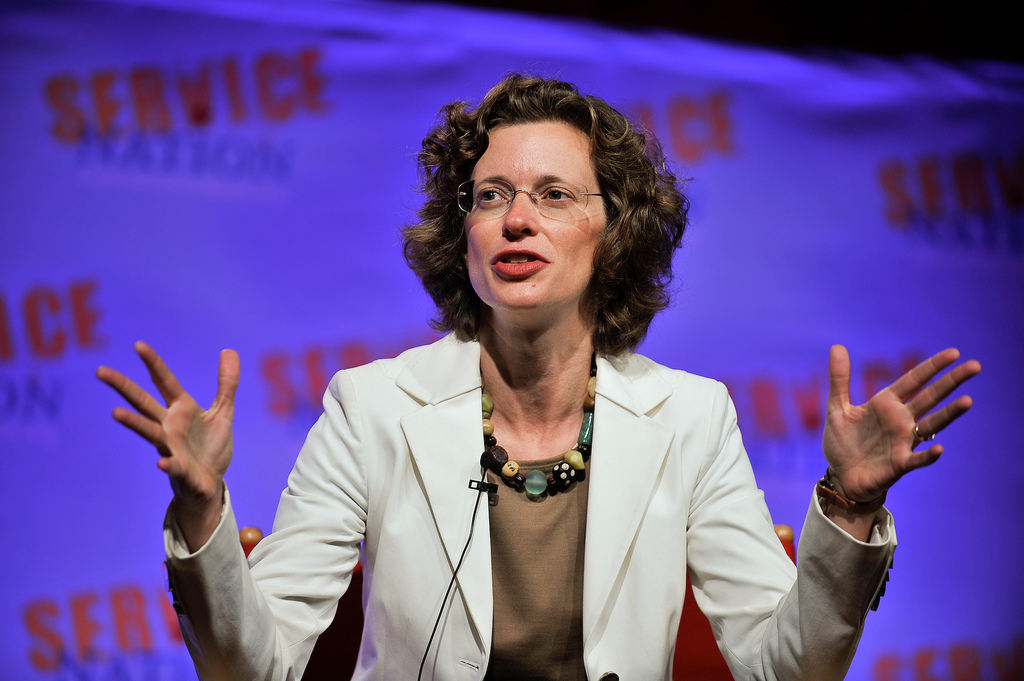By: Rachael Zipperer
By any other name, Michelle Nunn might not cause a stir. Since she officially announced her candidacy to fill Saxby Chambliss’ soon-to-be-empty seat earlier this week, Democrats have been hopeful and pundits have speculated that Georgia could elect a Democrat to the Senate in 2014. A great deal of this commotion is due to the candidate’s last name.
The new candidate’s father is none other than Sam Nunn, a former U.S. Senator from Georgia. As a well-liked and respected Blue Dog Democrat who represented Georgia in the Senate in the ’80s and ’90s, Sam Nunn‘s legacy and (importantly for his daughter’s campaign) his name are fresh in the minds of many Georgia voters.
In the short amount of time she has been campaigning, it seems that Nunn is already starting to incorporate her famous name into her strategy. An interview with the Atlanta Journal-Constitution from this week gives testimony to Nunn’s strategy of claiming her name rather than her party. Though the interviewer directly asked about Nunn’s voting record and ideology, Nunn backed away from explicitly identifying as a Democrat, but she was quick to proclaim that her father would definitely play a role in her campaign. Typically, candidates will seek their party’s primary win by edging toward the ideological extreme, then lean back toward the middle in the hopes of garnering support of moderates in the general election. In Nunn’s case, no extreme liberalism has shown itself. In fact, she is already playing for the middle. She has yet to embrace her party’s label; she did not even use the word “Democrat” in her release. When asked about her party label, Nunn skirted around the word “Democrat,” even denying the label of “Blue Dog” in preference of the term “independent-minded.” Throughout this interview, Nunn presented herself as a pragmatic candidate. Thrown the question of “have you ever voted for a Republican?” she diverted attention to the fact that she has worked with Republicans; and in the many questions targeting her ideology and party, Nunn continuously presented herself as concerned about issues rather than labels. Rather than espouse a liberal platform, she played the middle. Nunn used the phrase “common ground” to describe how she hopes to win the seat, and she reassured the interviewer that she is interested in all of Georgia, not just Democrats. So it is clear that Nunn is hoping to gain the support of Democrats as well as middle-of-the road voters and even more moderate Republicans, all of which are demographics she will need in order to win in a red state.
During the same interview, Nunn was eager to answer “yes” to the question of her father’s involvement in her campaign, saying he would play an active role. This quickness to embrace her family’s name rather than her party’s name hints at which identifier Nunn anticipates will better help her to win in Georgia.
Of course, Michelle Nunn has relevant credentials beyond her last name. She formerly worked as executive director for Hands on Atlanta and she founded and leads the international volunteer organization Points of Light. Created as a response to President George H.W. Bush’s call for volunteerism, the organization takes its name from one of Bush’s own speeches on the subject. Nunn also served on the President’s Council on Service and Civic Participation under George W. Bush. This experience in leadership and in working with prominent members of the opposite party makes Nunn a viable candidate independently of her political family, though no discussion of her campaign is compete without her famous father.
Having never held elected office, unlike the Republicans in the race thus far, Nunn is also characterized by her status as a political outsider. However, with her family’s legacy, Nunn could possibly have the best of both worlds in this situation. She is neither inexperienced in politics nor corrupted by Washington. Again, this is an area where her name and its reputation can help to give Nunn an edge. The question is in how much of an effect Nunn’s name will have.
Name recognition helps to influence voters’ decisions when they cast their ballots, but it is not usually the dominant factor in determining elections. With party politics becoming increasingly polarized, the letters “R” and “D” that appear beside the candidates’ names are certainly more influential than the names themselves. But even with the majority of voters adhering to their party lines, there remains some leeway for Democrats to make a comeback in Georgia. As minority populations increase and urban areas like Atlanta continue to grow, Georgia is becoming increasingly more blue. For instance, the very same Senate seat that Nunn and the rest are vying for was a close contest in 2008. The run-off that resulted from that contest between incumbent Saxby Chambliss and Jim Martin, though Chambliss ultimately won reelection, shows that maintaining two Republican Senate seats is not a sure thing for Georgia.
Though it is much too early to tell with any certainty how Nunn or other possible Democratic candidates will fair in the election next year, as of now it seems that a test of Michelle Nunn against a Republican candidate will be in part a battle between name recognition and party lines.



